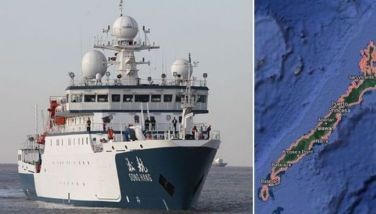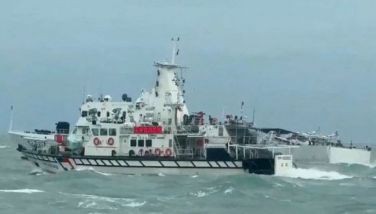Media's dilemma: 'Tuta' or watchdog?

WATCHDOG: When press icon Eggie Apostol was the publisher-chairman of the Inquirer and I was the editor-in-chief, we had a policy that required a staffer or officer to resign if he/she or his/her spouse or a family member accepted an appointment to a government position.
By tradition, the press maintains an adversarial position vis-à-vis the government. Indeed, how can a true journalist keep his proper distance and perform his avowed watchdog function if he is actually a tuta (lapdog) to his master in the Palace?
Many newspapermen taking their mission to heart – especially those who rose from the beat – did not give it a second thought when offered a juicy position in government or a state-controlled firm. They rejected the sinecure outright.
To avoid conflict of interest, those who opted to accept government posts promptly resigned from private media.
* * *
NEW ETHICS: But times seem to have changed. We now find ourselves surrounded by chameleons that masquerade as journalists but are actually government functionaries or operators on the sly.
There is a blurring of the line separating the press and the government. The supposedly reformist Aquino administration has imbedded its propagandists in private media, in effect emasculating the press as an institution. While railing against corruption, it is busy corrupting media.
It is unfortunate that some media men now holding plum posts in government do not see anything wrong in this. This could be partly because they belong to that new breed that had slipped in through the side door of the press room without going through the crucible of beat coverage.
At least broadcaster Ricky Carandang resolved the budding conflict by quitting his job with ABS-CBN after the May 2010 elections to become co-head of the Communication Group of Malacañang. That was an honorable solution.
* * *
FUEL LEAK: On Friday, justices of the Supreme Court will take off their togas and go out to inspect the West Tower condominium and environs in Bangkal, Makati City, affected by a leak in the 117-kilometer pipeline delivering oil-based fuel from Batangas to Metro Manila.
Acting on a novel writ of Kalikasan (nature) petition last year of various groups led by West Tower residents, the tribunal has issued a temporary environmental protection order (TEPO) closing the line and instituting measures to minimize adverse effects of the leaking fuel.
The SC directed the First Philippine Industrial Corp., which operates the line, to close it until further orders. Actually the FPIC had already stopped using the pipeline in obedience to an earlier order of a Makati court.
The SC justices are expected to check if its order is being obeyed, if the FPIC cleanup has been adequate and if more remediation measures are needed. It will also ascertain the veracity of a claim of the complainants that the pipe has two more unreported leaks.
* * *
CRUCIAL INSPECTION: The outcome of the SC inspection is crucial not only to FPIC and the West Tower residents (who had evacuated), but also to millions of consumers reeling from the continually rising price of oil-based fuel.
Around half of the fuel supply in Metro Manila used to be moved by Shell and Chevron using the FPIC line. Now they truck it overland, adding to expenses. Petron still uses barges to ferry its fuel from its refinery in Bataan to the Pandacan depot in Manila.
Although the FPIC cleanup started last year as soon as the leak was discovered under the Magallanes flyover, there are reports that FPIC has not been allowed full access to some parts of the building needing inspection and cleaning.
To speed up remediation, the condominium owners may want to give the FPIC a fair chance to make a good job of cleaning the place and repairing the damage.
* * *
FPIC COMMITMENT: A highlight of the SC visit is the inspection of the basement where the seepage was/is greatest. A clearer picture is expected to emerge when the justices report on their findings.
FPIC president Anthony Mabasa has affirmed the firm’s commitment to the remediation and rehabilitation of West Tower and the Bangkal area.
“Our contractors are working 24/7 to haul the water tainted with hydrocarbon in the basement of West Tower,” he said. “We are also installing an on-site treatment facility to further hasten the cleanup.”
He said a team of local and foreign experts has been helping out. He expressed confidence that given ample elbow room and the support of agencies concerned, “the remediation of the affected areas in Bangkal will be done in the most judicious and efficient manner.”
* * *
LEGAL TRIVIA: I again learned something new in a chat yesterday with former PCU law dean Ernesto L. Pineda related to the oath-taking on April 14 of those who passed the last bar examinations. Passers comprised 19 percent of the more than 5,000 who took the tests.
Pineda said a passer will still not be considered a member of the bar if he (a) took his oath but did not go to the SC to sign the Roll of Attorneys (Aguirre vs. Rana, 403 SCRA 343), or (b) was allowed to sign the Roll of Attorneys but did not take his oath (In re: Elmo S. Abad, B.M No. 139, March 18, 1983).
The passers who did not complete the process were not considered disbarred, because only members of the bar may be disbarred. Instead, all courts were directed not to allow them to appear before them.
* * *
FOLLOWUP: Read past POSTSCRIPTs at www.manilamail.com. Or Like POSTSCRIPT on facebook.com/manilamail. E-mail feedback to fdp333@ yahoo.com
- Latest
- Trending




























